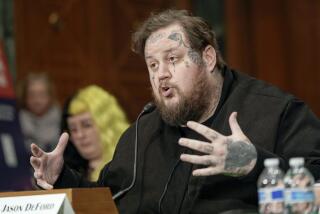Schuller Withdraws From Drug Reform Petition : Legalization: Pastor says he does not want to give impression of supporting decriminalization of some substances. He says he hastily signed document without reading it.
- Share via
GARDEN GROVE — In an attempt to dispel any notion that he was advocating the legalization of drug use, the Rev. Robert H. Schuller, pastor of the Crystal Cathedral, announced Friday that he is removing his name from a petition to reform national drug laws.
Schuller, in a news conference at the church, said he signed the petition in haste and was unaware until recently that the resolution organizer, Orange County Superior Court Judge James P. Gray, has waged a campaign for the legalization of some drugs.
Although the petition, now backed by a number of prominent figures, does not mention decriminalization, Schuller said the public perception of his involvement had become blurred.
“In no way do I support a position that would decriminalize drugs,” Schuller said. “It’s a poison.”
The resolution Schuller endorsed states in part that current drug policies have failed and that society has suffered “enormous financial cost and loss of civil liberties” in the attempt to resolve drug problems through the criminal justice system. It calls for a commission to be empowered by President Clinton and Congress to recommend revisions in the law.
Schuller said he had talked about the issue recently with Orange County Sheriff Brad Gates, but said that the decision to remove his signature was his own and that he was not bowing to pressure from followers of his worldwide ministry. Gates has been extremely critical of the judge’s position.
The religious leader’s weekly “Hour of Power” television show is beamed to an estimated 13 million people throughout the world.
“My mind was changed by Robert Schuller,” the clergyman said. “I want to disavow myself from a resolution that a new movement should be started.”
When he met with Gray and others last month to discuss the resolution, Schuller said Friday, he was pressed for time and he was not aware of the judge’s stance on drug use.
Schuller was out of the country when his support was announced last week, also at a news conference at the Crystal Cathedral.
“I don’t feel as though I was deceived by Judge Gray,” Schuller said. “He thought I knew who he was and what he was advocating.”
Gray, who was in Eureka on Friday addressing a gathering of judges on the same issue, said he was “sick about any misunderstanding that may have occurred.”
But Gray said Schuller seemed to be aware of his position at that first meeting. Gray said he remembered Schuller telling him that he could sign the resolution but would not join the judge in his push to make some illegal drugs available to the public.
“I have as much admiration and respect for Rev. Schuller (as for) anyone alive,” Gray said. “I am very deeply sorry that there has been this misunderstanding.”
Other prominent people who have signed the resolution are former Secretary of State George P. Shultz, Baltimore Mayor Kurt Schmoke and economist Milton Friedman.
That Schuller would add his name to the resolution surprised many, especially those involved in local anti-drug efforts.
“Today, (Schuller) clarified his position,” said Tom Wadkins, a special agent with the Justice Department who is also a member of Orange County’s Drug Advisory Commission. “His association appeared to give credibility to the legalization of drugs and that’s not the position he wanted to support.”
Wadkins and others involved with the local anti-drug effort attended the morning news conference.
“The way to win this war is to continue to do what we have been doing for seven years,” said Michael Hayde, board president of the Drug Use Is Life Abuse organization. “Proponents of legalizing drugs are only looking at it from a criminal justice perspective,” he said in a written statement. “They see overcrowded jails and conclude that we can solve this problem by legalizing drugs.”
Aside from his philosophical differences with Gray, Schuller said there are points within the written resolution that he did not agree with based on a second reading.
“There is nothing in here that says that good is being done,” Schuller said, holding up a copy of the document. “It implies that everybody who has been working at this has failed. I don’t want to sign anything that would be so perceived.”
More to Read
Sign up for Essential California
The most important California stories and recommendations in your inbox every morning.
You may occasionally receive promotional content from the Los Angeles Times.













